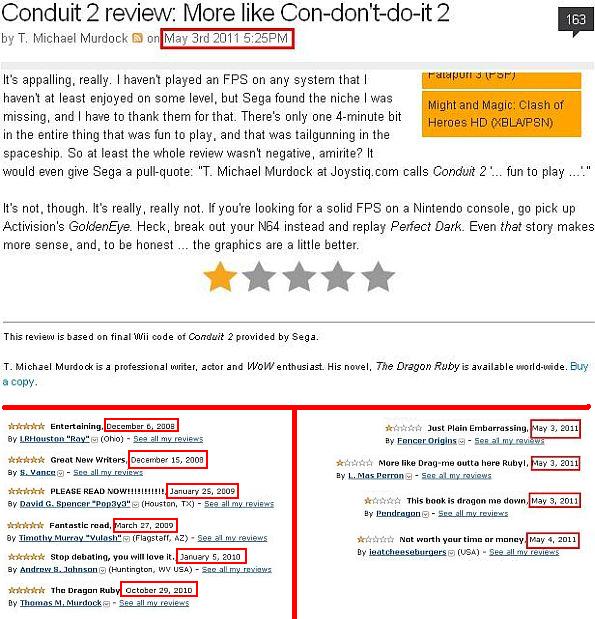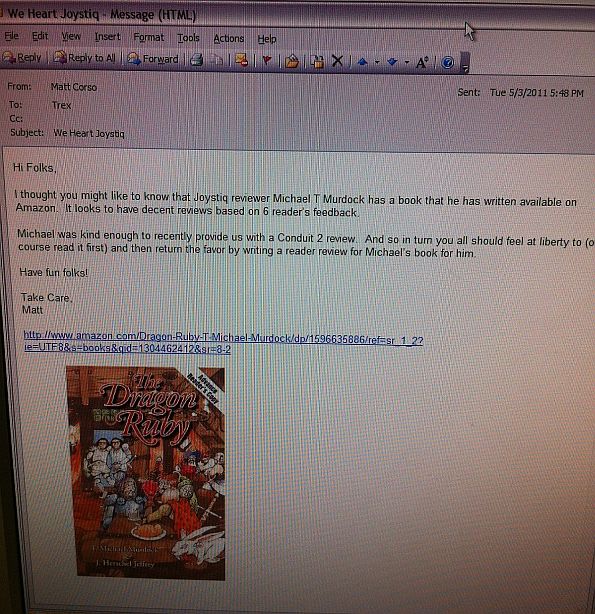Conduit 2, the sequel to 2008’s The Conduit, was released for the Nintendo Wii console in mid-late April to what can only be described as…varying reviews. Seeing wildly disparate reviews is not uncommon on the Internet, where everyone has a chance to be heard (if they yell loud enough); not everyone is going to have the same opinion of a game depending on personal preference, experience, and more. What happens when a harsh, negative review with supportive reasoning of an anticipated video game goes up? Well, heaven has no rage like love to hatred turned, nor hell a fury like a developer scorned.
Do you remember the old Hair Club for Men commercials where the presenter would finish up by saying something along the lines of, “I’m not just the founder, I’m also a client,” and hold up a picture of his previously bald head? Well, I’m not just a VG Journalism writer, I’m also a reader. As a reader, one of the most important things I look for in a writer or news/opinion outlet is integrity. I have no use for disingenuous reviews and opinions that are a direct result of publisher or developer pressure on the writer. The value of the writing is completely lost because it becomes nothing more than an advertisement, rather than a critique. I instantly lose faith in any outlet that knowingly publishes anything unauthentic. As a writer, and co-founder of Marooners’ Rock, I can guarantee that you will never see an insincere word on this site.
T. Michael Murdock’s 1-star review of Conduit 2 on Joystiq was unarguably harsh, written almost in disbelief of how bad he found the game to be. As harsh as his words were, he provided reasons behind some of his dislike of the game: the graphics were badly rendered, the suit/spaceships/environments at times looked to be pulled directly out of Halo, the voice-acting was bad, the levels are repetitive and re-use environments (something that is joked about in the game itself), and more. On the other hand, he stated that he did not put much time or effort into the online functionality, so his review is incomplete. So yes, while his words were harsh, they were not completely unsupported by reason. While honesty and reason are two core elements of a good review, there must also be respect and tact. This article completely lacked both in how it was written.
Did you know that T. Michael Murdock is also a published author? He has a book on Amazon that he links to in the signature of his review. Up through the end of October, 2010, it was rated at 5-stars. The very day that his Conduit 2 review appeared, the 1-star reviews started appearing on his book’s Amazon page, back to back.
“Disgruntled readers” has been the explanation so far. Readers with large emotional investments in Conduit 2 saw his review and, shocked at his insulting 1-star rating, retaliated in kind by giving his book 1-star ratings.
Now for the truth.
High Voltage Software is not only the developer behind Conduit 2, they are also the culprit behind the retaliatory comments and 1-star ratings found on T. Michael Murdock’s book. Now, this is a bold statement, and a potentially ruinous one for us, without evidence of our claim.
A source that will remain anonymous provided us with this image of an internal email from Matt Corso, Art Director for High Voltage Software. The email, depending on timezones, seems to have been sent less than half an hour after the review was published on Joystiq. In it, Matt indirectly directs at least one department at High Voltage (possibly more, depending on the size of the “Trex” distribution list) to “return the favor” of T. Michael Murdock’s Conduit 2 review by providing reviews of his book on Amazon.
A writer’s duty is not to the publisher or developer, but to the reader. A writer who is provided a review copy of a game does not have an obligation to give the game a good review; they do have an obligation to review it thoughtfully and thoroughly, regardless of the resulting score. They should not have to fear possible blacklisting simply for expressing their opinions. Sure, if a reviewer just puts a game on blast without providing any kind of reasoning, or without having experienced everything the game had to offer, the developer/publisher should feel free not to send them any more games; that’s the prerogative of the developer or publisher, and should be expected. Otherwise, they need to just suck it up, accept the constructive criticism the writer provides, and try to do a better job next time.
T. Michael Murdock could have worded his review in a more professional and respectful manner; I cannot argue that. Even if T. Michael Murdock’s review was completely baseless, though, with no reasoning in it at all, a personal attack on the writer is uncalled for. It’s unprofessional, childish, and vindictive. Writers should never have to worry about a personal attack from a developer or publisher, whether they’ve written a good review or not. In this situation, Matt Corso (and any High Voltage Software employees who followed his suggestion) acted like petulant children and brought shame to the game.
SEGA, to my knowledge, has had nothing to do with this unprofessionalism and was not aware of it in any way.
UPDATE:
We have received a response from Eric Nofsinger, Chief Creative Officer for High Voltage Software, regarding this issue. In it, he apologizes on behalf of High Voltage Software, but claims that the email was sincere, not sarcastic as I (and the rest of the Internet) have read it:
Matt Corso did indeed write that internal email, however if you read the email he encourages folks to read Mike’s book and then write their own review in a “turn-about is fairplay” sort of way. The email went to 70+ people on the list contains nothing slanderous or inflammatory; I believe people took it as such (the fact that there aren’t 70 negative reviews would support that assumption). Sure, it’s a tad unprofessional but if you knew Matt personally as I do, you would know it was nothing more than a tongue-in-cheek jibe at most. And for that, I apologize on behalf of High Voltage Software.
He brought the issue up to Matt Corso, who apologized, saying:
My mind really wasn’t in that dark of a place when I wrote that. In fact I seriously considered buying the book myself. I wanted to know how good it really was that this guy felt so in the right to trash our game and give away the ending like he did. And then post a plug to his book at the end, implying that we suck and he is totally great. Then I forgot about it, and got busy with other stuff. But I can see why some people might try to read more into this. But I did mention that people should read the book before giving a review.
He closes with the following:
My point is: I did want you to know we don’t hold a grudge against reviewers for their opinions. We learn through critique.
While I absolutely appreciate the professional and polite response from Eric, I do feel compelled to point out that when reading the captured internal email from subject to closing, you can’t help but find it to be an indirect call to his staff to submit negative reviews on the review author’s book. After a negative review like the one T. Michael Murdock presented, “We Heart Joystiq” and “…return the favor…” do not exactly convey sincerity. Additionally, after this news broke, three of the four negative reviews have disappeared from the Amazon page. Whether this is from Amazon cleaning up obvious troll comments or the commenters removing their own troll comments, I don’t know.
To be clear on our position, we feel the issue is not necessarily the negative comments (because they honestly COULD have come from anyone), but rather the seemingly indirect and sarcastic instruction from Matt Corso to his staff to do so.



